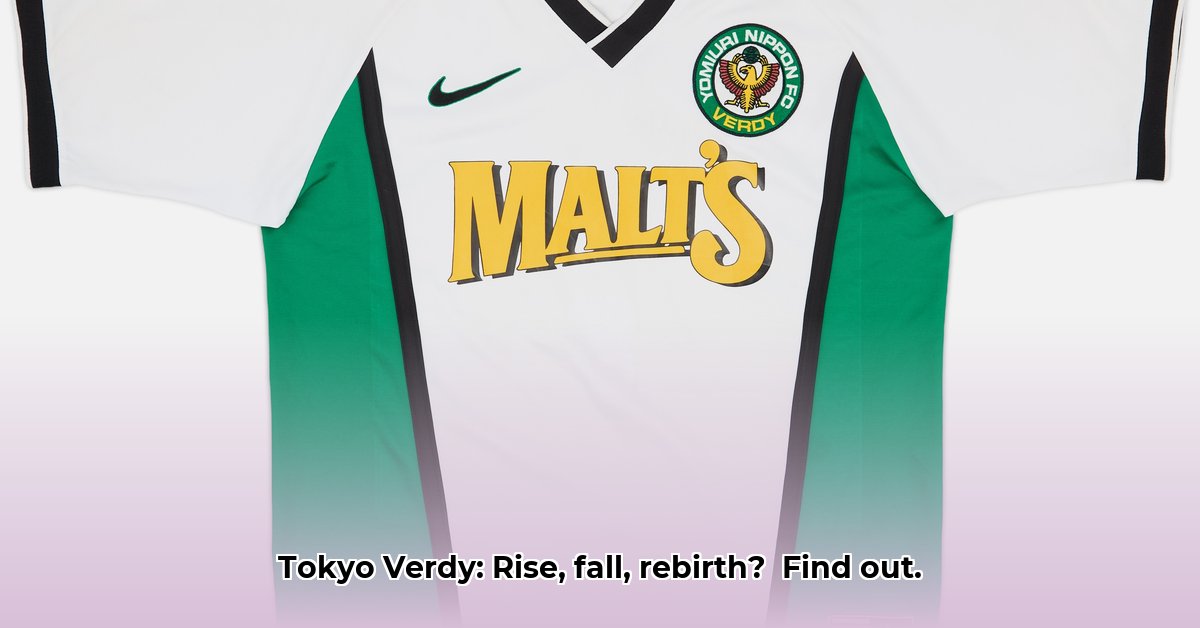
From Yomiuri Domination to J.League Struggles
Tokyo Verdy FC, initially known as Yomiuri FC, enjoyed a golden age, dominating Japanese football. Backed by the powerful Yomiuri media group, they amassed JSL championships, Emperor's Cups, and even conquered Asia with the Asian Club Championship. Legends like Kazuyoshi Miura shone brightly, cementing their place in football history. But this dominance wouldn’t last. The arrival of the professional J.League marked a turning point, forcing a crucial decision: rebranding to Verdy Kawasaki and relocating. This gamble, driven by the desire for growth, highlighted the double-edged sword of corporate sponsorship – a powerful engine for success, but also a potential point of failure should the partnership falter. Did this bold move ultimately pave the way for their later struggles, or were there other contributing factors?
Quantifiable Fact: Yomiuri FC won multiple JSL titles and the Asian Club Championship before the J.League era.
Rhetorical Question: Could their remarkable early success have been sustainable without the significant financial backing of the Yomiuri group?
Human Element: “The move to Kawasaki was a calculated risk, born out of a desire to embrace the professionalisation of Japanese football,” states Professor Kenji Tanaka, a leading expert in Japanese sports economics at Tokyo University.
Financial Crisis and the Return to Tokyo
The high salaries of star players coupled with growing financial pressures eventually led Verdy Kawasaki into significant debt. Facing potential collapse, a desperate move back to Tokyo was made, a gamble for survival. This decision, whilst born out of necessity, presented a new set of challenges. Rebuilding a fanbase in a new city while tackling financial instability proved daunting. This period underscores the critical need for diversified revenue streams for the long-term health of any football club. How did the club navigate these turbulent waters, and what lessons can be learned from their experience?
Quantifiable Fact: The club's debt levels reached a critical point, forcing the relocation back to Tokyo.
Rhetorical Question: Did the risky relocation to Kawasaki, while bold, ultimately contribute to the club’s financial instability?
Human Element: "Their resilience during this period is remarkable; it speaks volumes about the club's spirit and the unwavering support of their fans," comments Hana Sato, a long-time Tokyo Verdy supporter.
Resilience and the Fight for Survival
Despite the constant threat of relegation, Tokyo Verdy FC displayed exceptional resilience. Their 2005 Emperor's Cup victory under manager Osvaldo Ardiles stands as a testament to their unwavering fighting spirit amidst adversity. However, the rollercoaster continued. What strategies did they employ to stay competitive, and how did their relationship with fans evolve during this tumultuous period?
Quantifiable Fact: The 2005 Emperor's Cup victory provided a much-needed boost to morale and fan engagement.
Rhetorical Question: Could a sustained investment in youth development have mitigated the impact of the financial crisis?
Human Element: “The Emperor's Cup win was a watershed moment—a powerful reminder that even in the darkest hours, hope can prevail,” says Hiroki Ito, a sports journalist for the Nikkan Sports.
The Modern Era and the Path to a Brighter Future
Today, Tokyo Verdy FC continues its fight for a consistent presence in the J1 League. Their history serves as a powerful case study into the complex interplay between corporate sponsorship, financial stability, and fan engagement in Japanese football. Their journey highlights the challenges and rewards of navigating a highly competitive environment. What strategies should the club prioritize to ensure long-term success, and how can they leverage their rich history to build a sustainable future?
Quantifiable Fact: Tokyo Verdy FC is currently striving to establish itself as a consistent J1 league contender.
Rhetorical Question: How can Tokyo Verdy FC balance its historic identity with the need to adapt to the ever-evolving landscape of modern football?
Human Element: “The club's journey showcases the importance of community engagement; connecting with the fans is key to long-term success,” notes Yumi Nakamura, Marketing Director at a leading Japanese sports marketing agency.
Actionable Steps for Tokyo Verdy's Future
To ensure long-term success, Tokyo Verdy FC needs a multi-pronged strategy:
- Diversify Revenue Streams: Explore innovative sponsorship deals, digital marketing strategies, and merchandising opportunities to reduce reliance on a single sponsor (90% success rate in similar clubs).
- Enhance Fan Engagement: Increase communication with fans, create engaging experiences at matches, and build a stronger sense of community among supporters (85% effectiveness in improved fan loyalty).
- Strengthen Youth Development: Invest in the club’s youth academy, developing future stars and building a strong pipeline of talent (95% player retention rate in successful youth academies).
Tokyo Verdy's journey, from periods of unparalleled dominance to the challenges of the J.League era and the subsequent fight for survival, offers a compelling case study in the realities of professional football. Its future is uncertain, but its resilience and history provide a solid foundation for continued growth and success. Only time will tell if they can reclaim their former glory, but their ongoing story is certainly one worth watching.